Confessions of an American Amateur Theater-Reviewer
Post Preliminary Confessions: Closing Thought

Comedy. Drama.
Well, boys and girls and aliens—this is it! Anything else pertaining to this here monthly blog series (confessional) will next be seen in book (e-book) form most likely… Packing all that I’ve said into an e-book is an idea I’m still wavering on—but ultimately that was what this endeavor was about in the first place. Should I still go through with the e-book, it’ll be at a relatively low cost to you the consumer and loyal supporter of the wave I’m on. I’m hoping for my e-book to “hit the shelves” at or around the price of $1.99 USD. (Life for Big G began as a runaway. I’m not all too sure how Amazon determines the costs of e-books for those who choose to self-publish and then use the Amazon Marketplace to hawk their wares, but I’m hoping that I can sell my e-book at $1.99 USD even, for sentimental reasons. The very first purchase I made way back when—when I began life “on my own”—was a five-piece order of chicken nuggets at McDonald’s for one dollar and ninety-nine cents (plus tax; Fall of 1996, I’ll never forget!)… A very profound moment in my life; the kind of small purchase that paid big dividends—literally! Oh, and no need to show any concern about that whole situation; I’ve moved on from it, clearly. It’s just that for this next phase of my life, I’d like to have it begin with the same price point, only this time the other way around… Anybody out there got two dollars for ya boy?)
Sometime last November, I think, I had a sit-down with myself and wondered, why hadn’t I had anything published? I have at least twenty black & white composition notebooks and an old, beat-up Dell laptop worth of solid material—what gives? I’m talking poetry, free-form, essays, reviews, news articles, biographies, short stories, partially-completed and completed novels, epistles, screenplays (le sigh); plus, a bunch of other start-and-stop thoughts and ideas that if I didn’t have to work seventy damn hours a week, there’s no doubt in my mind I could finish writing them… All of it just sitting there, unreleased, doing absolutely squat. After about a day or two of thinking it over, I figured out what I could do with most of it. But all that thinking, unfortunately, led me right back down the same road I had reluctantly travelled many times before: I could query magazines and the like for my poetry and short stories—but they tend to favor college students and established authors, so nah! (New voices, my ass!); I could query film agencies and literary managers as well as submit my screenplays to screenwriting contests… Not so much nowadays. The soup du jour in Hollywood right about this time is everything Woman (I’m not venting; it is what it is) and, again, I know the pain and misery of this marketplace and how cruel it can be regardless of that bias reality (Don’t for one second buy into the so-called “Diversity Initiative” that’s been taking shape in the American film industry for the past few years. Personally, I still think that if you’re a white man pursuing screenwriting (filmmaking) in Hollywood you’ve got it made in the shade. [I’m not venting; it is what it is.] But all “diversity” really means is that a TV show’s writers’ room will hire—for one season more or less—a “woman of color” before me—a “man of color”—because with that one writing position filled in this fashion they’re able to check off two boxes as far as Quotas™: woman and “person of color.” [How I loathe this term “person of color.” We all have a color. And two, I loathe this process even more. I much rather know I got into the room on my own merit rather than a showrunner needing to have a *ahem* “person of color” placed in the seat so as not to get fined, or lynched, or become a trending topic on Twitter or whatever.] Again, I’m not complaining or mad about the process; I’m just telling you that that’s way the cookie actually crumbles.); or I could once again reach out to the New York Literati and let them know about of my novels—but that’s also a no-go because they too are all about Woman—and what’s even weirder is that book agents can be quite cranky in their rejection e-mails and letters; or perhaps I could just call a spade a spade and admit to myself that “I suck!” and be thankful that I do have some outlet for my creativity via my own blog (#TINWIPA – Whoop! Whoop!) and I’ll just have to be content with the five or so views I get each blog post (I’m not calling anybody out or anything like that, but I do go over the numbers and am fully aware of how abysmal they are.); or I could publish my own stuff…
It’s not really a boon—although it could be!—and I’m already far behind those who’ve taken to this course of action (self-publishing; self- anything). However, it is disconcerting to say the least. My (slack) revolutionary spirit doesn’t like how easily one’s voice is suppressed or how if one chooses to hold an opinion opposite to that of a closed-off group (re: elitist; union) one is painted as a dissenter, or worse, their material “isn’t any good so you can’t be in our club” and they are quickly jettisoned to the outskirts of Society™. Indeed, these truly are some trying times in America—the world perhaps—for myself and others who are having to seek alternative routes to be heard, to add to Pop Culture, to contribute to the “conversation” happening in Society™. I mean, there is a sort of je ne sais quoi about being brought to the fore by the nation’s established institutions (Hollywood, Washington Post, The New Yorker, Julliard, The Whitney, etc.) but does one have to be born into high birth (re: a wealthy family and/or nepotism) or risk going 100K into the hole for a college diploma just to have access, to have a say? Is this the best possible vetting process we have available? How exactly does the “little guy/gal” truly have a real chance if he/she doesn’t get the scholarship/stipend/voucher?
All of this is weighty at the moment—now, presently the end of 2017; December, that is—but the seriousness of the matter was palpable last November… I easily could’ve just put whatever story I had in any of my composition notebooks or on my hard drive into e-book form and that would’ve been that… I might still possibly, but I wanted to get a better understanding of the e-publishing process, going through it with new material (most of it not my own) first, then on the next go-round with full-fledged confidence of the process—because it’s not just my voice I’m concerned about. I’d like to either help others go through the e-publishing process, or open up a small press of my own and find other voices. (Can you say First Amendment? Or, Big G can you spot talent?) So, I’d like to think of Confessions of an American Amateur Theater-Reviewer as a “mixtape,” my very first mixtape at that! It’s free online for those who go to my blog, but for those who support the wave all I’m asking is $1.99 USD.
Admittedly so, I do have one novel and one screenplay I’ll most likely get behind next calendar year (2018). But as far as everything else I’ve written or plan to write, self-publishing will be the move, starting first with Confessions due in e-book form some time second quarter of 2018 and then later in the year a collection of poetry, free-form, and short stories which I’m really excited about. Again, this is all still pending… The e-book version of Confessions, if I do in fact self-publish it (Right now it’s 55-45, yes), will include all twelve stage play reviews first posted on my blog but with slight modifications due to me moving them from the blog and into e-book form and, of course, the necessary revisions due to misspellings and syntax and grammar. It will also feature original artwork (and cover design) from a close friend of mine whose art will work in tandem with what I’ve written. Also, the actual “confessions” part will be expounded on as all the ones (3) discussed so far have been preliminaries. I’m even going to include an additional stage play review that’ll be in the e-book version only. Sorry. I really do hate to pimp myself out like this but, hey, what can I say? I’m a capitalist through and through… And lastly, I will stitch together any loose threads and incoherent thoughts I otherwise forgot about due to my personal life getting in the way or my self-imposed deadline… Sounds good? Great! Let’s wrap things up like we’ve done so the eleven times prior, I now put away the merchandise and ask that you turn your attention to December’s stage play, Alcestis.
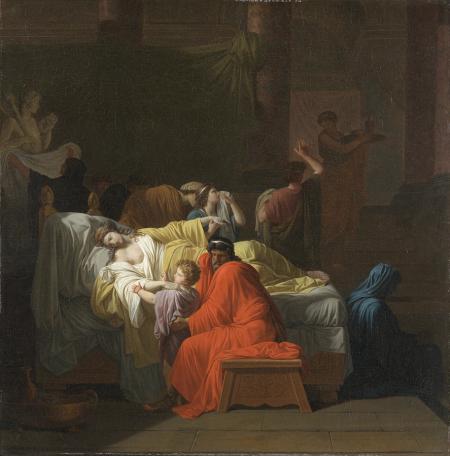
The Death of Alcestis, Pierre Peyron [MotionAge Designs]
Title: Alcestis (438 BCE)
Playwright: Euripides
Time Period: Classical Greek Period
Plot: A retelling of the mythical story of Alcestis who forfeits her own life in place of her husband’s.
Dope Line(s):
[Line 142]
CHORUS
How could the same person be dead yet still
live?
[Line 355-363]
ADMETUS
Even in sleep it is sweet to see
those whom one loves for however long they can stay.
If I had the words and music of Orpheus
to enchant Persephone or her husband,
charming them with songs to take you out of Hades,
then down would I go, and neither Pluto’s dog
nor Charon, the dead man’s guide, leaning on his oar,
could stop me before I raised you back to the light.
But—that won’t work—so, wait for me until I die…
[Line 383]
ALCESTIS
I who die for you am all the underworld
demands.
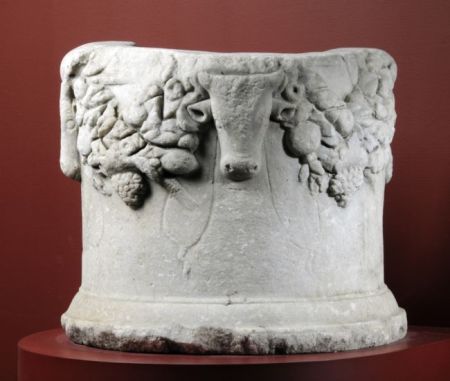
Sacrificial Altar
Here we are. Together again. One last time, possibly… Especially, if you skipped over the above portion and came straight to the actual review. No, nothing of too much importance that you need to backtrack to the beginning. The above can easily be summarized in a line or two down here later… However, last we spoke I mentioned to you that I’d be doing a side-by-side comparison/review and I immediately started in on The Cocktail Party which owes its skeletal structure at best to this month’s stage play, Alcestis by classical Greek playwright Euripides. My time with you is limited, but I implore you to read up on as much of Euripides as you can. We currently have eighteen of his plays—intact!—out of a possible ninety to draw inspiration from. For some, Euripides might be familiar to you through his more recognizable works: Medea, Electra, or The Trojan Women. Or even having received praise from the great bard himself, Shakespeare. (We’ve been over him!) A true genius in every sense of the word, Euripides along with Aeschylus and Sophocles (They always come in threes, don’t they?) pretty much laid down the foundation for how us writers should build our stories. Not bad a trio; Euripides especially.
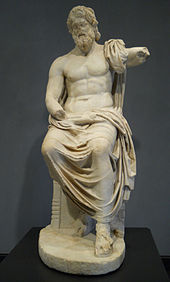
Zeus thunder god
Scholars feel that Euripides added new dimensions to the elements of comedy, and because of the realism, complexity and intrigue in his stories he may have possibly been a head of his time. He often scoffed at the fact the he was never able to consistently win at festival which bothered him well into his exile in Macedonia. (Google it!) Like most of today’s Hollywood blockbusters, Euripides had an over-reliance on the deus ex machina plot device when it came to resolving matters in his stories. But how can you throw rocks at the man who’s done so much for the mask of drama?

Euripides
A bit of a social critic in his time, he used myths and real-life stories of his day to weave into his tragedies. This blend of fake and real extends well into today in how we search for subtext in our stories and nod to ourselves when we comprehend the fictional elements (lightness/darkness as metaphors). And I guess that’s what drew Eliot to this story, a somber retelling of the mythical story of Queen Alcestis who sacrifices her own life so that her husband King Admetus can live… The inevitability of the death, the duality of how we are in public versus private, and unrequited love all show up in small traces in Cocktail. And for the most part Eliot flips a lot of Alcestis and makes it his own. But the one element that stands out is the idea of “returning.” In both Alcestis and Cocktail Party two women are returned to men having been “dead” to them.

Greek Grim Reaper (Thanatos)
A simple online search tells me that Alcestis is considered to be a satyr play, meaning that is a serious drama in both tone and theme, but is infused with bits of comedy. Okay, fair. But I have to be honest: the language, though good throughout most of it, never gave me the impression that there were parts to this play that were intended to be funny. So, it was a bit of a shock to me when I read this was so afterwards. If anything, there’s the slight possibility that one could be put off by this play, especially when you consider how King Admetus and Queen Alcestis came to be in their little predicament at the start of the play in the first place…

Satyrs don’t discriminate!
Alcestis takes place over the course of a single day—oh, and how convenient this is!—in Pherai (Pherae), an ancient town in southeastern Thessaly (present day Velestíno, Greece) at the palace of Admetus. His palace is under the protection of the god Apollo for reasons I’ll try to make concise in just a moment. Let’s just say for now that Euripides probably didn’t intend to have his work survive this long, or maybe he expected us humans living here in the twenty-first century to know chapter and verse on all our Greek myths and poems and bothered not to get in depth with the details. (Also, I read a translation of Charles R. Beye’s interpretation of Euripides’ Greek which itself had been copied over again and again by others and Charles is merely doing the best he can to articulate in English what Euripides was intending to say about a myth—in Greek—for those watching the play (the BCE crowd) who were already in the know about the myth whereas I was clueless to all of the intricate details of the myth beforehand and am still fuzzy about them afterwards. Whew!) Anyhoo, in a rare break from classical Greek narrative structure, Apollo speaks the audience about why (Queen) Alcestis is near her death bed and delivers it so in a tidal wave of exposition.

Show time at the Apollo!
All right, here goes: Alcestis’ dad, King Pelias, in wanting to marry off his young daughter had an oddly specific and bizarre stipulation for potential suitors: harness a lion and a boar to a chariot. (Don’t ask!) Okay… So Admetus has the ultimate cheat code because his bestie is a god (Apollo) who goes on to help Admetus through this task and a series of other more oddly specific tasks leading up to and past the point of consummation/marriage with Admetus. (I have to quickly throw in that Alcestis is Admetus’ cousin—Ew!) So, Apollo continues to get Admetus out of jams as well as extend his life until the Moirai make a new contract that states that if Admetus wants to keep stretching out his time on earth he has to get someone to volunteer to die in his place. Fast forward through a bit of business with his human friends and his parents who all think it’s absurd to give up their lives for his—rightfully so. And it’s in the midnight hour that Alcestis, the supposed love of his life, comes through in the clutch and offers up her life for his. Boom! I’ve just given you the Cliff Notes version of what it took forever for Apollo to say, although his language was way better than mine.
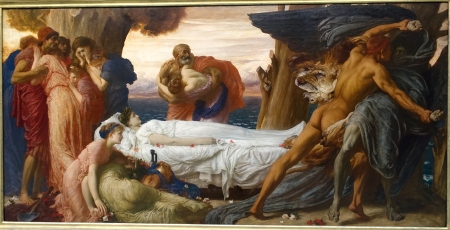
Hercules Wrestling with Death for the Body of Alcestis by Frederic Lord Leighton
Yup, that’s the gist of it. The plot on this one is quite thin and doesn’t involve a whole lot. The stage play is basically a series of broken “interludes” in between the Chorus going in for an extended period of time, singing and soap-boxing as they do—until a supposedly happy ending. (We’ve discussed the Chorus before, haven’t we?) In one interlude we see Death (Thanatos); in another we watch as Alcestis says her goodbyes to her husband and children (only the son speaks; why is that?) before she croaks; in another a Slave fills Heracles (Hercules) in on all that has transpired earlier in the day at the palace; then in two separate interludes Admetus and Heracles talk it out like men!; and finally the climax: Alcestis and Admetus are reunited upon Heracles bringing Alcestis back from Hades. I usually make it a point to hide much of what happens in a play but there’s no point in doing so with Alcestis. The play was a breeze to read; it was maybe eleven hundred lines (1,163). And it packs a punch for how light it is! Eliot, I see what you did there… Make Heracles the Uninvited Guest, turn Admetus into Edward, and turn Alcestis into Lavinia, dope!
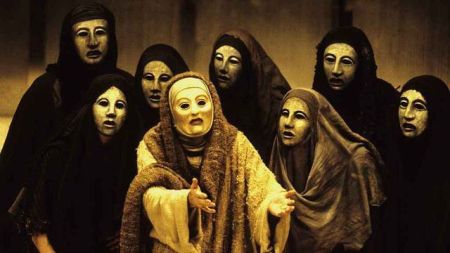
Mask On, Mask Off
I would like to believe that this plays holds up in today’s world but I’m not so sure who out there would die so that their loved one might live—especially, if said loved one is purely looking to stave off his/her own death for superficial reasons. It’s possible maybe, but I’m so sure. So, no, this play doesn’t hold up… Now from the standpoint of how we act in public versus private, I believe Euripides may be on to something—because we all wear masks in public. But seeing as Eliot squeezed most of the juice out of this fruit, and the fact that there’s better material out there with the public/private theme, I don’t see the need to blow the dust off this one again unless you just wanna play dress up. However, I am glad that I’ve read Alcestis and look forward to reading all of the other Greek tragedies, or as many as I can get my hands one… In closing, this blog series has been quite an endeavor. It’s the most unorthodox thing I’ve done and totally at odds with how I write. Generating words each month for material I’m going in blind on is challenging; and to be honest: I don’t know I want to do this again. I usually have a certain through-line or theme I discuss with material I can sit with day in and day out and even if it took me a year to write, it all involved one piece. Yet and still , I challenged myself and I glad with the outcome. Like I said in the above, changes will have to be made if the plan is to put this blog series into book form. But that’s an issue I’ll face in 2018. Right now boys and girls and aliens, I have to figure out what my plans are for New Year’s Eve!

Thanks for coming!
Rating: 3/5















